Why Inflammation Matters and How Mushrooms Can Help
Mushrooms with anti-inflammatory properties aren’t a replacement for medical treatment, but they can play a valuable role in supporting your body’s natural balance. When used as part of a holistic approach to wellbeing, these functional fungi work alongside conventional care—helping to promote resilience and complement your overall health plan.
If you're looking for natural ways to support healthy inflammatory response, here's a quick look at the most effective options:
| Mushroom | Key Anti-Inflammatory Compounds | Primary Benefits |
|---|---|---|
| Reishi | Triterpenes, ganoderic acids | Reduces NF-κB activation, modulates immune response |
| Turkey Tail | Polysaccharide-K (PSK), beta-glucans | Inhibits pro-inflammatory cytokines, supports gut health |
| Lion's Mane | Hericenones, erinacines | Reduces neuroinflammation, supports nerve health |
| Chaga | Betulinic acid, inotodiol | Potent antioxidant activity, inhibits COX-2 |
| Cordyceps | Cordycepin, adenosine | Suppresses inflammatory pathways, reduces oxidative stress |
| Shiitake | Lentinan, eritadenine | Modulates cytokine production, supports cardiovascular health |
| Maitake | D-fraction, beta-glucans | Balances immune response, supports metabolic health |
Inflammation is a natural response of your immune system to damage or threat. While acute inflammation helps your body heal, chronic inflammation can silently damage tissues and contribute to serious health issues including heart disease, diabetes, and autoimmune conditions.
Research shows that edible mushrooms contain diverse bioactive compounds with significant anti-inflammatory effects. These fungi modulate key inflammatory pathways in your body—many mediated through the NF-κB cascade—helping to reduce excessive inflammation without suppressing your immune system's protective functions.
Mushrooms contain a variety of naturally occurring compounds—like beta-glucans, triterpenes, and polysaccharopeptides—that have been studied for their potential to influence the body’s inflammatory processes.
These bioactive molecules are found in many edible and medicinal mushroom species, and ongoing research continues to explore their roles in supporting immune balance and overall well-being. My own journey into this world began from a deeply personal place.
I’m Brandi Garden, co-founder of Eversio Wellness, and I started exploring mushrooms with anti-inflammatory properties while searching for natural solutions to manage my own autoimmune challenges. That search quickly grew into a passion, and eventually, a purpose-driven mission to share their potential with others.

Inflammation 101—Why It Matters
Ever notice how a paper cut turns red and swells? That's inflammation at work—your body's natural defense system jumping into action. While this response is vital for healing, sometimes inflammation doesn't know when to quit, and that's where things get tricky for your health.
Acute vs. Chronic Inflammation
Think of acute inflammation as your body's first responders. When you get injured or catch a cold, your immune system rushes in with heat, redness, swelling, and sometimes pain. This response is actually good news—it means your body is fighting off damage and infection exactly as it should.
Chronic inflammation is a whole different story. It's like having those first responders camped out permanently, even when there's no emergency. This silent, persistent inflammation can simmer below the surface for months or years without obvious symptoms. Yet all the while, it's potentially damaging your tissues and organs.
Research has linked chronic inflammation to some serious health concerns:
- Heart disease
- Type 2 diabetes
- Arthritis
- Alzheimer's disease
- Certain types of cancer
- Autoimmune disorders
At the cellular level, inflammation involves a complex communication system. One key player is the NF-κB pathway—think of it as the conductor of your inflammatory orchestra. When activated, it triggers the production of inflammatory messengers called cytokines (including TNF-α, IL-1β, and IL-6) that can either help healing or, if chronically activated, contribute to disease.
Consequences of Chronic Inflammation
When inflammation sticks around too long, it can lead to metabolic syndrome—a cluster of conditions that includes high blood pressure, liftd blood sugar, excess belly fat, and abnormal cholesterol levels. Together, these dramatically increase your risk of heart disease, stroke, and diabetes.
Your cardiovascular system is particularly vulnerable to inflammation. The inflammatory process can contribute to atherosclerosis—the buildup of plaque in your arteries that can eventually lead to heart attacks and strokes.
For those with autoimmune conditions, inflammation becomes especially problematic. In these conditions, your immune system gets confused and starts attacking your own tissues, creating a cycle of chronic inflammation and damage.
Root Causes You Can Control
Here's the good news: many factors that drive chronic inflammation are within your control.
Diet plays a huge role in either feeding or fighting inflammation. Processed foods, refined sugars, and unhealthy fats can stoke your inflammatory fire, while a diet rich in colorful fruits, vegetables, whole grains, and healthy fats (like those found in olive oil and fatty fish) helps cool it down.
Stress isn't just in your head—it has real physical effects, triggering the release of inflammatory compounds throughout your body. Finding ways to manage stress through meditation, deep breathing exercises, or yoga can help turn down this inflammatory response.
Environmental toxins from pollution, household chemicals, and other sources can trigger inflammatory responses. Minimizing your exposure to these substances when possible can help reduce your overall inflammatory burden.
Sedentary lifestyle is a major contributor to chronic inflammation. Even moderate, regular physical activity has been shown to have powerful anti-inflammatory effects throughout the body.
By addressing these factors, you can help reduce chronic inflammation and support your overall health. And as we'll explore next, incorporating mushrooms with anti-inflammatory properties into your daily routine can provide additional powerful support for maintaining a healthy inflammatory response.
Mushrooms with Anti-Inflammatory Properties: The Bioactive Blueprint
Ever wonder what makes mushrooms with anti-inflammatory properties so effective? The answer lies in their fascinating biochemistry. These remarkable fungi have evolved an impressive array of compounds that work with our immune system in surprisingly beneficial ways.
The Key Compounds
Nature has equipped medicinal mushrooms with a powerful toolkit of bioactive substances that help tame inflammation. Beta-glucans are perhaps the stars of the show—these complex polysaccharides have a unique structure that allows them to bind to specific receptors on immune cells. This special interaction helps regulate inflammatory responses, boosting immunity when needed while preventing excessive inflammation.
Triterpenes are another inflammation-fighting powerhouse, particularly abundant in Reishi mushrooms. Research has identified more than 100 different triterpenes with anti-inflammatory activity in Ganoderma lucidum alone, with 50 being completely unique to this species! These compounds work by inhibiting the NF-κB pathway—a master regulator of inflammatory responses in your body.
Turkey Tail mushrooms are rich in polysaccharopeptides, which combine polysaccharides with proteins to create compounds with significant anti-inflammatory effects backed by both laboratory and clinical studies.
The benefits don't stop there. Mushrooms also provide:
- Ergothioneine: A unique amino acid and potent antioxidant that protects cells from oxidative stress
- Indoles: Compounds that influence both immune and nervous system function
- Polyunsaturated Fatty Acids (PUFAs): Precursors to compounds that help balance inflammatory processes
- Vitamins and Minerals: Including vitamin D, B vitamins, selenium, zinc, and copper—all supporting healthy immune function
How Mushroom Molecules Tame Inflammation
What makes mushrooms with anti-inflammatory properties truly special is their multi-pronged approach to regulating inflammation:
Through TLR Modulation, mushroom compounds interact with toll-like receptors—proteins that help your immune system recognize threats—to help balance immune responses. They're like the traffic controllers of your inflammatory response.
The NF-κB Blockade effect is particularly important. Many mushroom compounds, especially triterpenes, can inhibit the activation of this protein complex that controls DNA transcription and plays a crucial role in regulating inflammatory responses. By putting the brakes on NF-κB, mushrooms help prevent excessive inflammation.
Mushrooms also provide Antioxidant Protection, neutralizing reactive oxygen species (ROS) that can trigger and perpetuate inflammation. By reducing oxidative stress, they help break the cycle of chronic inflammation at its source.
The Gut-Immune Axis Support shouldn't be overlooked either. Many mushrooms contain prebiotic fibers that nourish beneficial gut bacteria. Since about 70% of your immune system resides in your gut, this creates a foundation for proper immune function and inflammatory regulation.
Synergy with Your Immune System
Unlike anti-inflammatory drugs that simply suppress inflammation (often with side effects), mushrooms work with your immune system in sophisticated ways:
They can train macrophages—a type of white blood cell—to respond more effectively to threats while avoiding excessive inflammatory responses. Think of it as education rather than suppression.
Some mushroom compounds support regulatory T-cells, which play a crucial role in preventing autoimmune reactions and excessive inflammation. These are like the peacekeepers of your immune system.
By supporting a healthy gut microbiome, mushrooms indirectly improve proper immune function and inflammatory regulation throughout your body.
The All-Star List: Edible Mushrooms with Anti-Inflammatory Punch
Now that we understand the mechanisms behind mushrooms' anti-inflammatory effects, let's explore the specific mushrooms that stand out for their inflammation-fighting properties.
Reishi—A Classic Mushroom with Anti-Inflammatory Properties
Reishi (Ganoderma lucidum), known as the "Mushroom of Immortality" in traditional Chinese medicine, has been used for over 2,000 years to promote health and longevity.
Key Anti-Inflammatory Compounds:
- Triterpenes (particularly ganoderic acids)
- Beta-glucans
- Polysaccharides
Research Highlights: Studies have shown that Reishi extracts can significantly inhibit the production of pro-inflammatory cytokines and suppress the NF-κB pathway. In one study, Reishi extract reduced inflammation in mice via modulation of the MAPK and NF-κB pathways.
Additional Benefits: Beyond its anti-inflammatory effects, Reishi is known for its stress-relieving properties and ability to support sleep quality. These benefits are particularly relevant for inflammation management, as stress and poor sleep can both contribute to chronic inflammation.
Lion's Mane—Brain Food and Mushroom with Anti-Inflammatory Properties
Lion's Mane (Hericium erinaceus) is distinctive for its cascading white spines and is renowned for its neuroprotective properties.
Key Anti-Inflammatory Compounds:
- Hericenones
- Erinacines
- Beta-glucans
- Polysaccharides
Research Highlights: Lion's Mane has shown particular promise for reducing neuroinflammation. A 2018 study found that Lion's Mane extract reduced inflammatory markers in the hippocampus, a brain region crucial for memory and learning. This may explain its beneficial effects on cognitive function.
Additional Benefits: Lion's Mane stimulates nerve growth factor (NGF) production, which supports nerve health and regeneration. It's also been studied for its potential to improve mood and reduce anxiety, which can be linked to inflammatory processes in the brain.
Turkey Tail—Gut & Immune Defender
Turkey Tail (Trametes versicolor) is one of the most researched medicinal mushrooms, with a strong track record for immune support.
Key Anti-Inflammatory Compounds:
- Polysaccharide-K (PSK)
- Polysaccharide-P (PSP)
- Beta-glucans
Research Highlights: Turkey Tail extracts have been shown to inhibit pro-inflammatory cytokines while supporting the production of anti-inflammatory compounds. Particularly noteworthy is its ability to modulate gut inflammation. In a mouse model of colitis, Turkey Tail supplementation reduced inflammation and improved gut barrier function.
Additional Benefits: Turkey Tail is a powerful prebiotic, supporting beneficial gut bacteria that play a crucial role in immune regulation. A 2014 study found that Turkey Tail extract favorably altered the gut microbiome composition, which may contribute to its anti-inflammatory effects.
Chaga—Antioxidant Powerhouse
Chaga (Inonotus obliquus) is not technically a mushroom but a sclerotium—a hardened mass of fungal mycelium. It grows primarily on birch trees in cold climates.
Key Anti-Inflammatory Compounds:
- Betulinic acid
- Inotodiol
- Melanin complex
- Polyphenols
Research Highlights: Chaga stands out for its exceptional antioxidant properties, which help combat oxidative stress—a key driver of inflammation. A 2016 study found that Chaga extract protected DNA from oxidative damage in lymphocytes of patients with inflammatory bowel disease.
Additional Benefits: Chaga has been studied for its potential to support liver health and blood sugar regulation, both of which are closely tied to inflammatory processes in the body.
What the Science Says—From Petri Dish to People
Ever wondered if mushrooms with anti-inflammatory properties actually work? Let's dig into what researchers have finded about these fascinating fungi, from laboratory studies to real people's experiences.
In Vitro Studies: The Foundation
Laboratory research gives us our first glimpse into how mushroom compounds interact with our immune cells. Scientists often use special cell cultures to see exactly what happens at the cellular level:
When researchers exposed RAW 264.7 macrophages (a type of white blood cell) to extracts from white button, crimini, shiitake, and oyster mushrooms, they observed fascinating changes in how these immune cells behaved. The mushroom compounds helped modulate inflammatory responses in a balanced way.
At the molecular level, we can see precisely how these mushrooms work. For example, triterpenes from Reishi directly inhibit the NF-κB pathway—essentially turning down the volume on inflammation signals in your body. Meanwhile, various mushroom polysaccharides interact with Toll-like receptors, helping your immune system respond appropriately to threats.
Some mushroom extracts even work similarly to common anti-inflammatory medications by inhibiting enzymes like cyclooxygenase-2 (COX-2) and 5-lipoxygenase (5-LOX), but without the harsh side effects that often come with pharmaceutical options.
Animal Models: Bridging the Gap
Animal studies help us understand how these benefits might translate to more complex living systems:
In studies using mice with induced colitis (intestinal inflammation), those fed a diet containing 2% white button mushrooms for 4 weeks showed significant protection from gut damage. This protection was linked to balanced immune responses in the digestive tract.
Reishi extract has shown impressive results in rat models of arthritis, with anti-inflammatory effects comparable to some medications. This suggests potential benefits for joint health and comfort.
Lion's Mane extract has been particularly notable in studies focusing on brain health, reducing neuroinflammation in animal models of Alzheimer's disease and depression. This aligns with the traditional use of Lion's Mane for cognitive support.
Bringing Anti-Inflammatory Mushrooms Into Your Routine
Now that we understand the science behind mushrooms with anti-inflammatory properties, let's explore practical ways to incorporate them into your daily routine.
Dosage Considerations
Effective dosages vary depending on the mushroom species, extraction method, and individual needs. However, here are some general guidelines:
- Reishi: 1-2 grams of extract daily
- Lion's Mane: 1-3 grams of extract daily
- Turkey Tail: 2-3 grams of extract daily
- Chaga: 1-2 grams of extract daily
- Cordyceps: 1-3 grams of extract daily
For whole mushrooms used in cooking, larger amounts can be consumed, as the bioactive compounds are less concentrated than in extracts.
Quality Matters: What to Look For
When selecting mushroom products, quality is paramount. Here's what to look for:
Whole Fruiting Body: Products made from the whole fruiting body (the part of the mushroom we typically see) generally contain higher levels of beneficial compounds compared to those made only from mycelium (the root-like structure).
Extraction Method: Dual extraction (using both water and alcohol) ensures that both water-soluble compounds (like polysaccharides) and alcohol-soluble compounds (like triterpenes) are present in the final product.
Beta-Glucan Content: Look for products that specify their beta-glucan content, as this is a key indicator of potency for many medicinal mushrooms.
Organic Certification: Choose organic products to avoid pesticides and other contaminants.
Dì Dào Cultivation: This traditional approach involves growing mushrooms in their spiritual and native homeland—the preferred environment, atmospheric energy, pressure, and altitude required for them to thrive and deliver their intended potency.
Eversio Wellness Formulations (High-Potency, USDA Organic)
At Eversio Wellness, we're committed to providing the highest quality mushroom extracts to support your health journey. Our products are:
- Made from USDA Organic Certified whole fruiting bodies
- Processed using dual extraction methods for maximum bioavailability
- Grown Dì Dào to ensure optimal potency
- Tested for purity and potency
Here are some of our formulations specifically designed to support healthy inflammatory responses:
Focus Now - Organic Lion's Mane 8:1 Dual Extract Capsules
Our Lion's Mane extract supports cognitive function and nerve health while helping to reduce neuroinflammation. The 8:1 concentration ensures you're getting a potent dose of hericenones and erinacines.
Chill Now - Organic Reishi Mushroom 15:1 Dual Extract Capsules
Our highly concentrated Reishi extract is rich in triterpenes and beta-glucans that help modulate inflammatory responses while supporting stress reduction and sleep quality.
Defend Now - Organic Turkey Tail 12:1 Extract Capsules
Our Turkey Tail extract is concentrated to provide optimal levels of PSK and PSP, supporting immune function and gut health—both crucial for managing inflammation.
Protect Now - Organic Chaga 8:1 Dual Extract Capsules
Our Chaga extract harnesses the powerful antioxidant properties of this unique fungus to help combat oxidative stress and support healthy inflammatory responses.
Energize Now - Organic Cordyceps 8:1 Extract Capsules
Our Cordyceps extract supports energy production and exercise recovery while helping to modulate inflammatory pathways.
Frequently Asked Questions about Anti-Inflammatory Mushrooms
Are mushroom extracts safe with prescription anti-inflammatories?
If you're taking prescription anti-inflammatory medications, you might wonder about adding mushroom extracts to your routine. While mushrooms with anti-inflammatory properties generally work well alongside conventional treatments, talk with your healthcare provider first.
Unlike pharmaceutical anti-inflammatories that often block specific inflammatory pathways, medicinal mushrooms work more holistically by modulating your immune system and promoting balance. This complementary approach can be beneficial, but your doctor should supervise this combination to ensure it's right for your specific situation.
As a simple precaution, we recommend taking your mushroom supplements at least 2 hours apart from medications to minimize any potential interactions. This timing helps your body process each separately and reduces the chance of unexpected effects.
Who should avoid mushrooms with immune-stimulating beta-glucans?
While beta-glucans offer remarkable immune-balancing benefits for most people, certain individuals should approach them with caution:
If you have an autoimmune condition, the immune-stimulating effects of beta-glucans might affect your symptoms differently depending on your specific condition. Some people find them helpful, while others might experience flare-ups. Working with a healthcare provider who understands both your condition and functional mushrooms is crucial.
Those taking immunosuppressant medications (such as after organ transplantation) should be particularly careful, as beta-glucans could potentially counteract the intended effects of these drugs.
People with known mushroom allergies should obviously avoid mushroom supplements, and if you're scheduled for surgery, it's generally wise to pause your mushroom supplements about two weeks before your procedure due to their mild effects on blood clotting.
Personalized guidance from your healthcare provider is always the best approach when adding any new supplement to your regimen, especially if you have existing health conditions.
Can I take multiple mushroom species together every day?
Absolutely! Not only can different mushroom species be taken together daily, but there may be significant benefits to this approach. Each mushroom contains its own unique profile of bioactive compounds that work through different mechanisms to support your health.
Think of it as assembling your wellness dream team – Reishi for stress reduction and sleep support, Lion's Mane for cognitive function, and Turkey Tail for gut and immune health. Together, they provide comprehensive support that addresses multiple aspects of wellbeing simultaneously.
At Eversio Wellness, we've created thoughtfully formulated mushroom blends that harness these synergistic effects:
The Refresh Set combines mushrooms that support overall wellness and vitality.
The Awaken Set focuses on energy, mental clarity, and cognitive function.
The Balance Set is designed to support immune function and stress management.
When beginning with multiple mushroom species, start with lower doses of each and gradually increase as your body adjusts. This gentle approach allows you to assess how your body responds to each mushroom and minimizes the chance of digestive discomfort that sometimes occurs when starting new supplements.
The beauty of mushrooms with anti-inflammatory properties is that they work together harmoniously, much like they do in nature, creating a balanced approach to wellness that honors your body's natural healing processes.
Open up Nature's Potential with Eversio!
When it comes to fighting inflammation naturally, mushrooms with anti-inflammatory properties offer something truly special. Unlike conventional anti-inflammatory medications that often work by blocking specific pathways, medicinal mushrooms help restore balance to your immune system—addressing the root causes of inflammation rather than just masking symptoms.
I've seen how these remarkable fungi can transform wellness routines. At Eversio Wellness, we're passionate about using their power through our USDA Organic Certified extracts. Our careful dual extraction process ensures you receive the complete spectrum of beneficial compounds—from immune-modulating beta-glucans to powerful anti-inflammatory triterpenes.
What makes these mushrooms so effective is their adaptogenic nature. They don't simply suppress inflammation (which can sometimes hamper your body's natural healing processes). Instead, they help your body respond appropriately to inflammatory triggers—supporting when needed and calming when excessive.
Think of adding mushrooms with anti-inflammatory properties to your daily routine as an investment in your long-term health. Whether you're managing occasional inflammatory challenges or simply supporting your body's natural balance, our mushroom extracts provide a gentle yet effective approach backed by centuries of traditional wisdom and modern scientific research.
The beauty of these natural solutions is their holistic effect. While supporting healthy inflammatory responses, they simultaneously provide additional benefits—from cognitive support to stress management and immune balance. This multi-faceted approach reflects how nature intended our bodies to heal and maintain wellness.
Our customers often tell us how incorporating our mushroom extracts into their routines has helped them feel more balanced, energetic, and resilient. Many notice improvements in their recovery after exercise, better joint comfort, and a general sense of well-being that comes from addressing inflammation at its source.
Inflammation itself isn't your enemy—it's a vital process that, when properly regulated, helps protect and heal your body. With the support of mushrooms with anti-inflammatory properties, you can help ensure this essential process remains in balance, supporting your vitality for years to come.
Your journey to natural wellness is just beginning. Let Eversio Wellness guide you through the remarkable world of medicinal mushrooms and their inflammation-modulating potential.



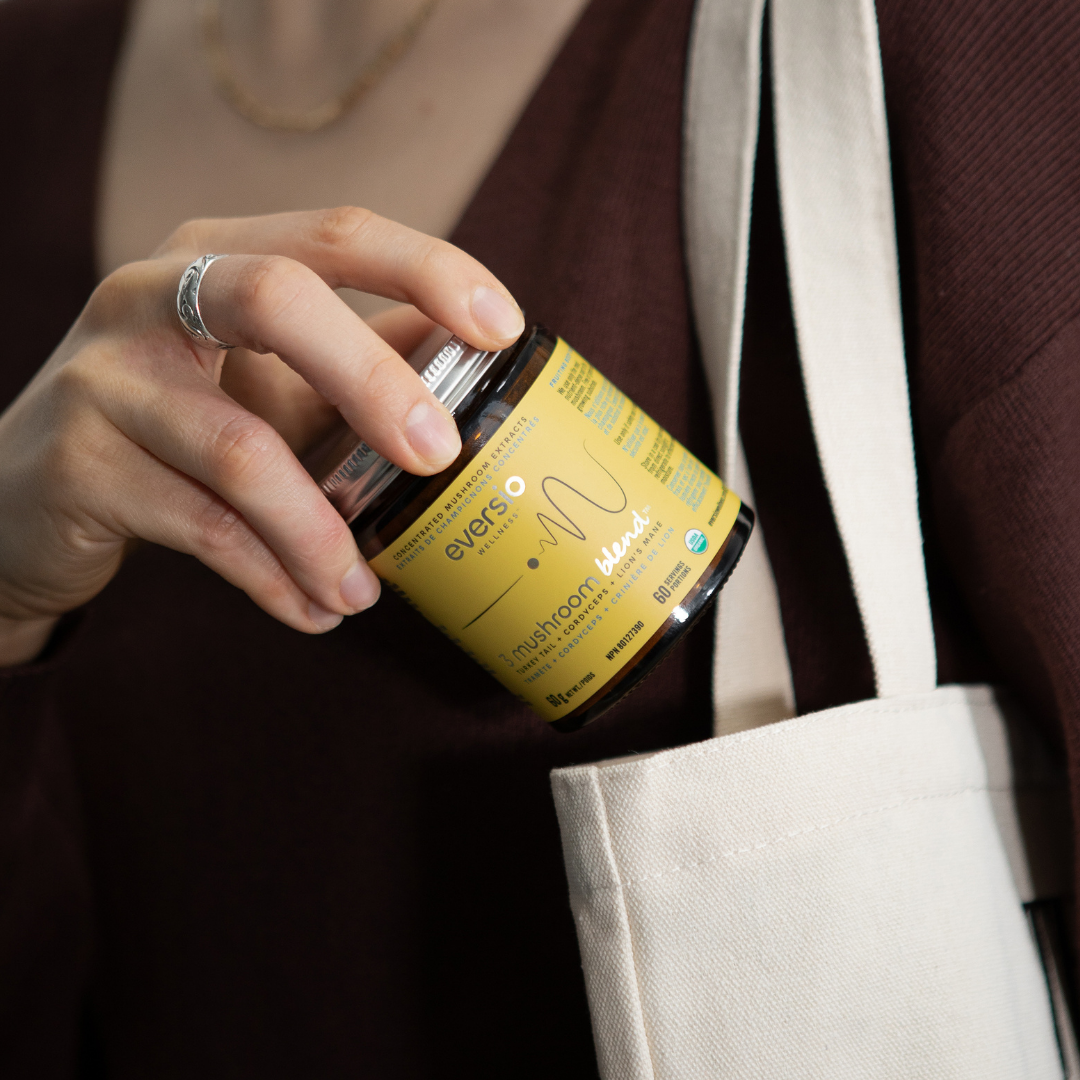

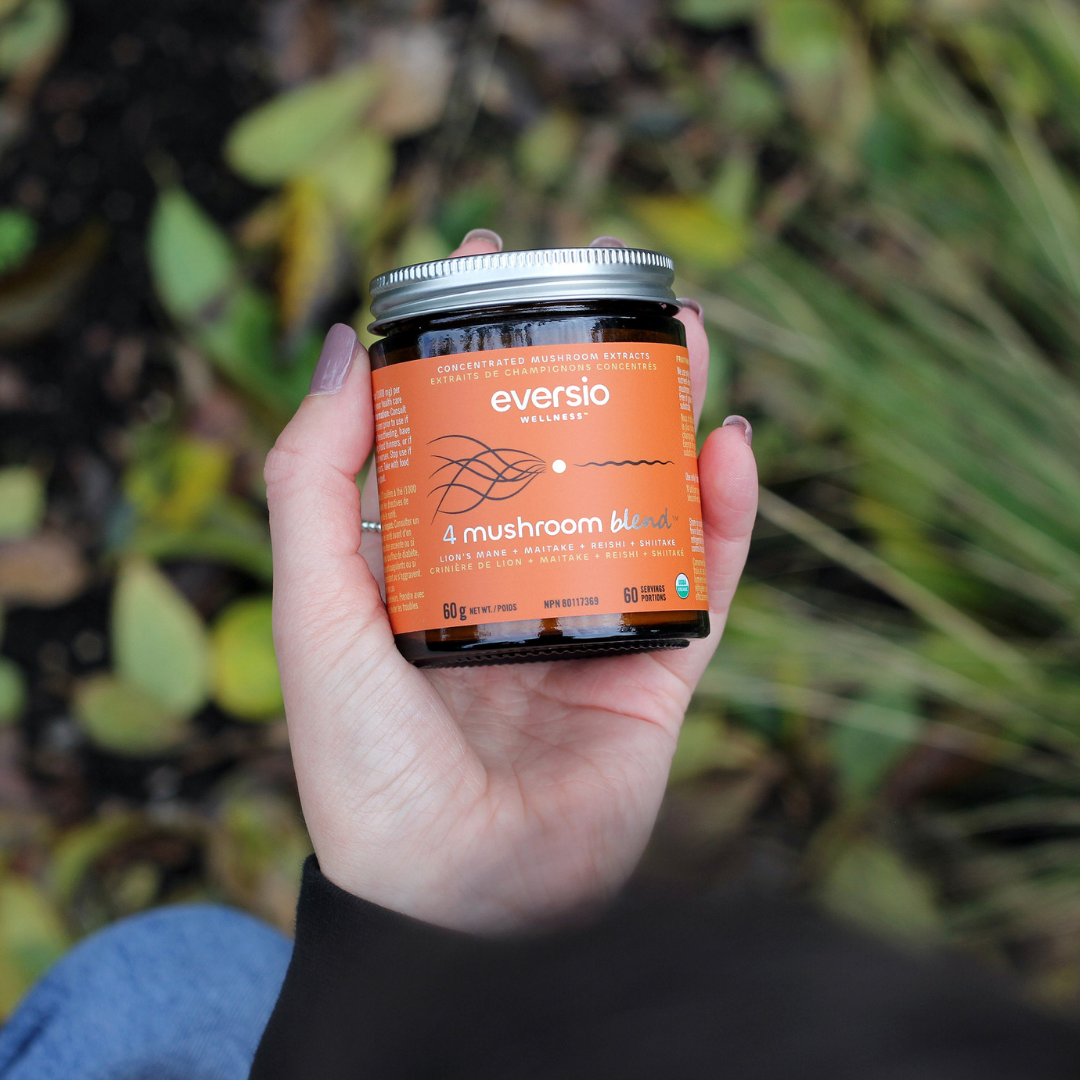

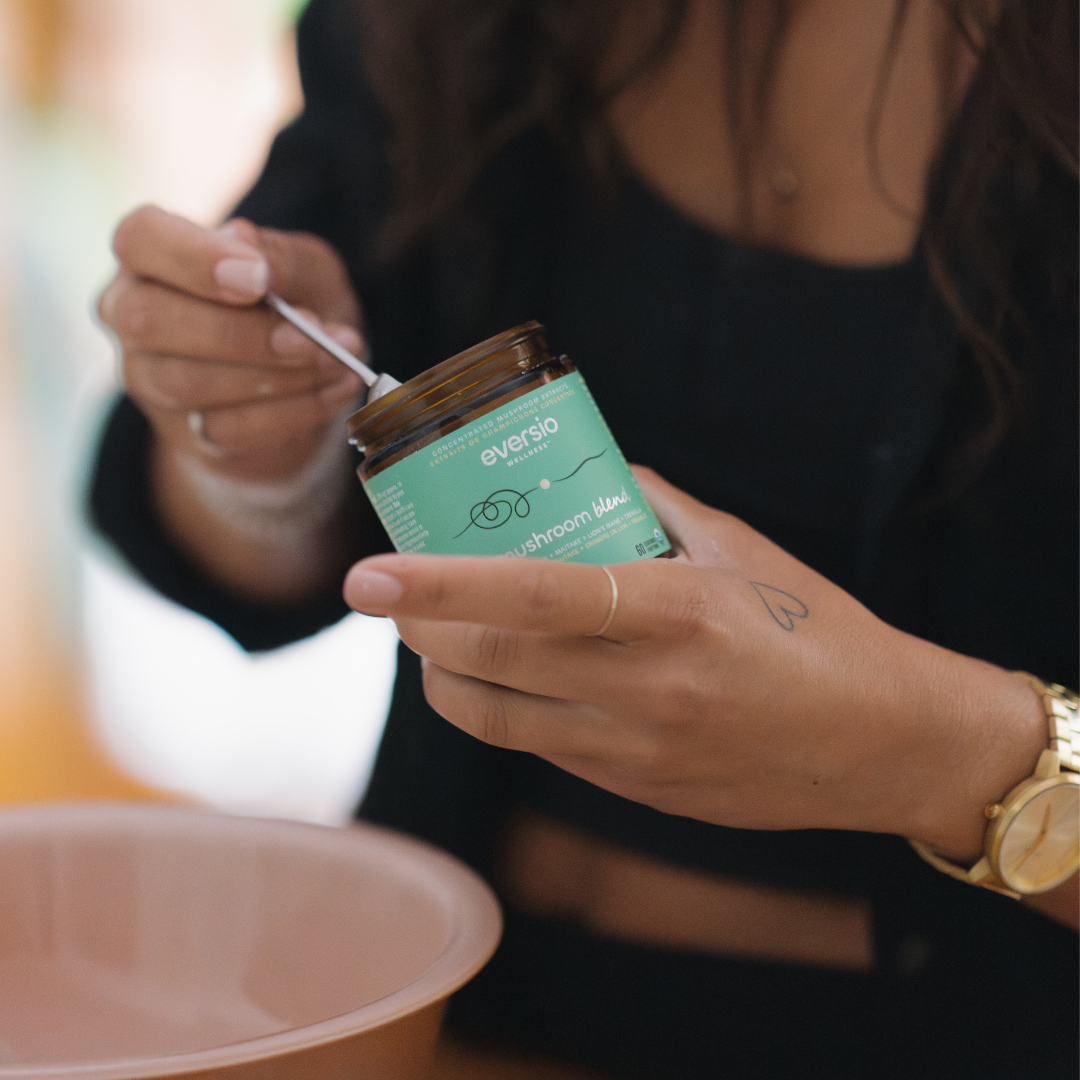

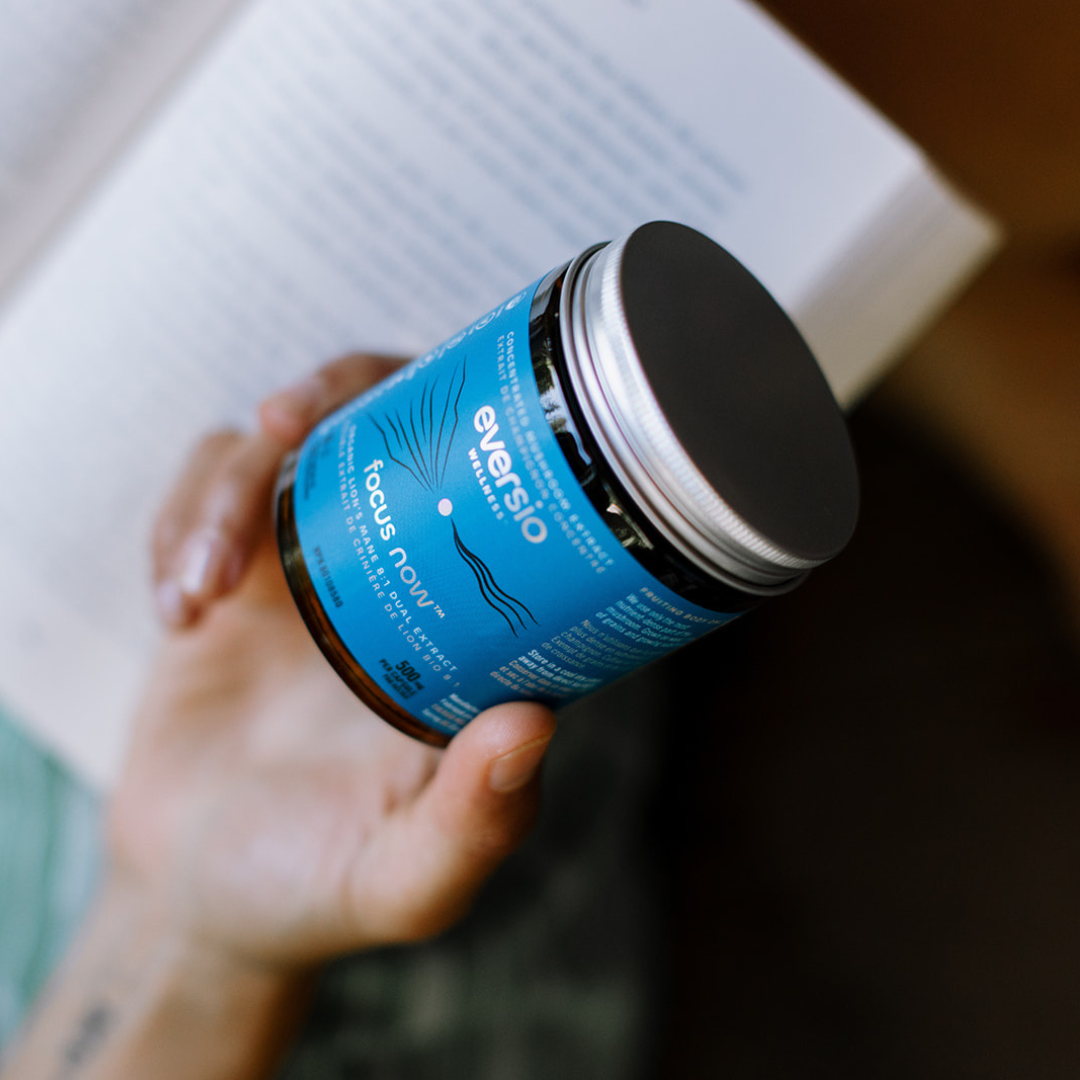

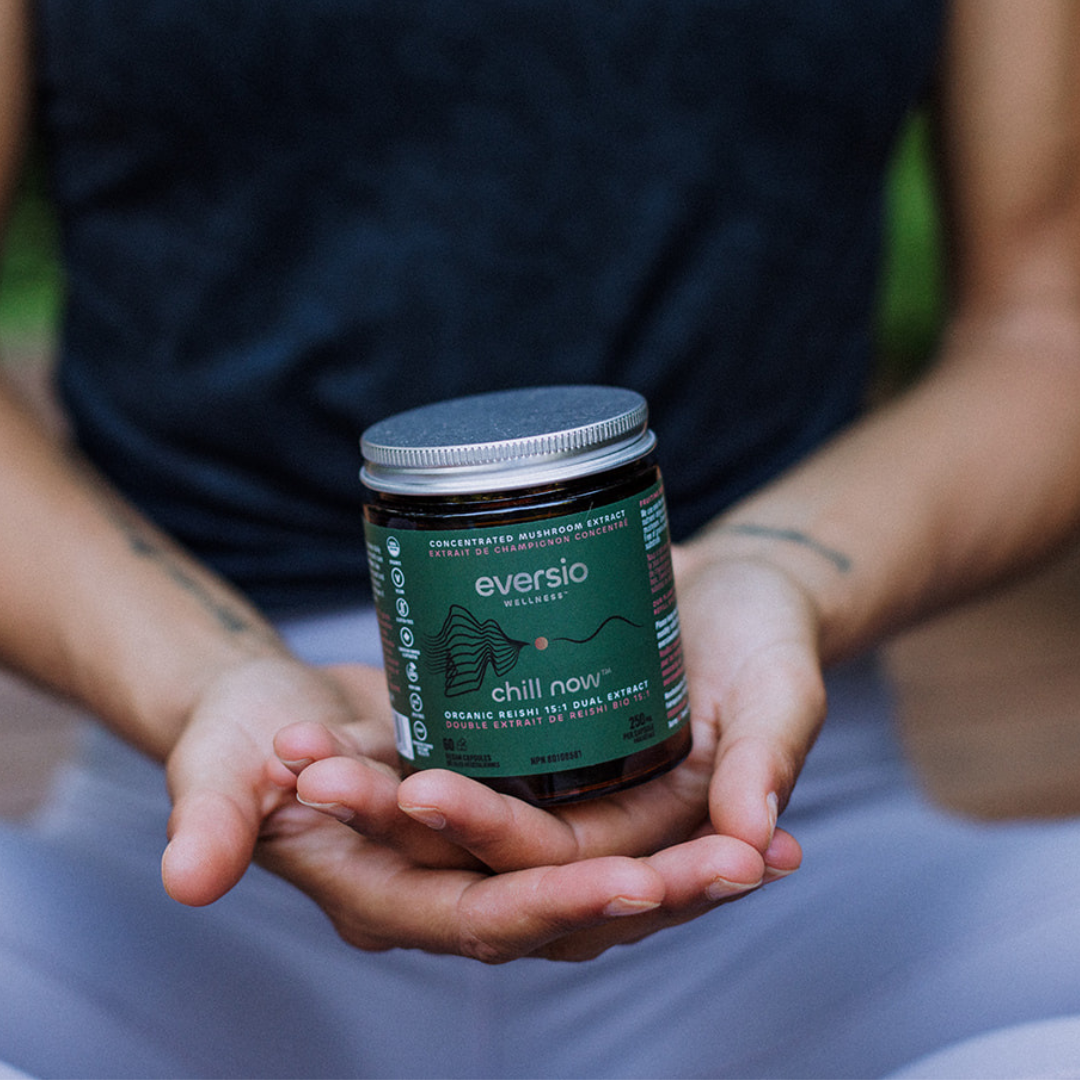
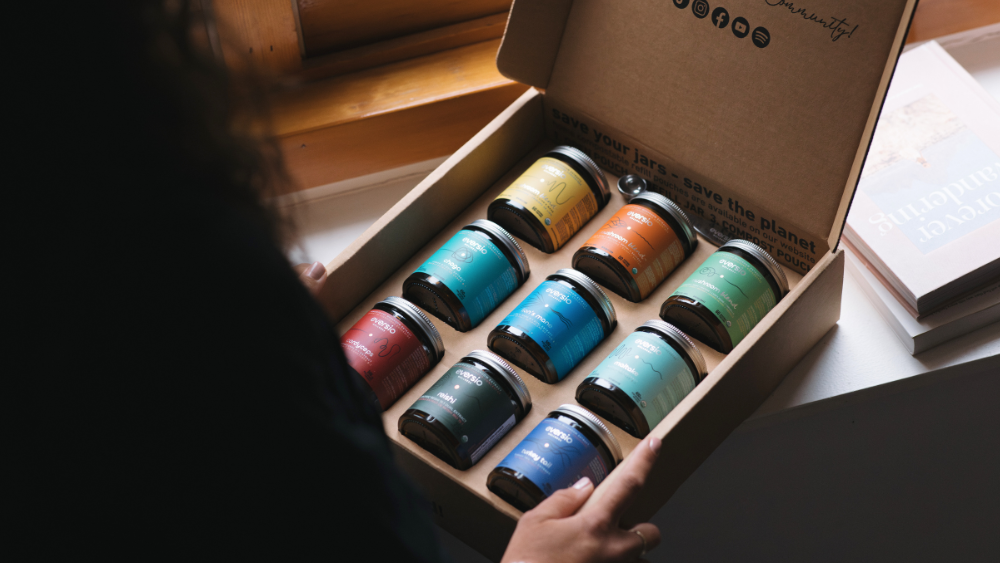







Leave a comment
This site is protected by hCaptcha and the hCaptcha Privacy Policy and Terms of Service apply.